 Pauline Hanson’s running mate, Malcolm Roberts, is a climate denialist of some fame, but in joining the Senate he is merely a noisy addition to the climate denialists already there, raising the question of how we deal with the phenomenon in the political sphere. We know that scientific information doesn’t work.
Pauline Hanson’s running mate, Malcolm Roberts, is a climate denialist of some fame, but in joining the Senate he is merely a noisy addition to the climate denialists already there, raising the question of how we deal with the phenomenon in the political sphere. We know that scientific information doesn’t work.
There was a similar problem in the Brexit campaign. John D has passed along to me a fascinating link from Climate Outreach about what they learnt.
They say:
- There are many curious parallels between the climate change and referendum debates. Following the language of social theorist Horst Rittel both issues are “wicked” problems: complex, multifactoral, and contradictory. Both issues struggle through the same cognitive landscape of bias, fear and group loyalty. And campaigners for both issues have failed to understand the way that people form their opinions.
They found that facts alone will not win an argument, and expert and elite opinion was portrayed as self-serving and out of touch with ordinary people.
Words and slogans can be powerful, and fear motivates, but:
- messages dependent on anticipatory fear are often rejected. Those disposed to believe them may actively ignore them in order to defend themselves against anxiety. People who are more sceptical see them as fear mongering…
There is a need to go beyond fear to a story, and better if it’s positive. The Brexit campaigners used fear, but incorporated fear within a more positive narrative of independence, national strength and renewal.
Fatally, the Remain campaign could not wax enthusiastically about the virtues of the EU.
Learning from Brexit, Climate Outreach argues that:
- political change requires mobilising support across boundaries of class and politics. Top down information-driven media cannot compete with personal contact and peer-to-peer communication.
Secondly, Climate Outreach emphasises the importance of peer-to-peer communications for complex technical issues. The Leave campaign was able to reach deep into neighbourhoods and communities where it could initiate conversations.
Thirdly, the referendum itself provided the focus that broke public silence or inattention to the issue. In a poll just two months before the referendum scarcely 15% of people rated “Europe” as a major issue facing the country. The referendum itself galvanised attention on the issue.
In a survey back in March, after the spectacular coral bleaching:
- 47% of people agreed or strongly agreed that “climate change and renewable energy will influence the way I vote at this year’s federal election”.
That was more than twice as many as the 22% who disagreed with the statement…
Climate change should have been a red hot issue in the election, but it didn’t grip, as Graham Readfearn reported just before the election. The title of his story has the message, there was a “tragic lack of leadership”. Climate change remained a second tier issue. The Climate Institute charted the party policy effects by 2030:
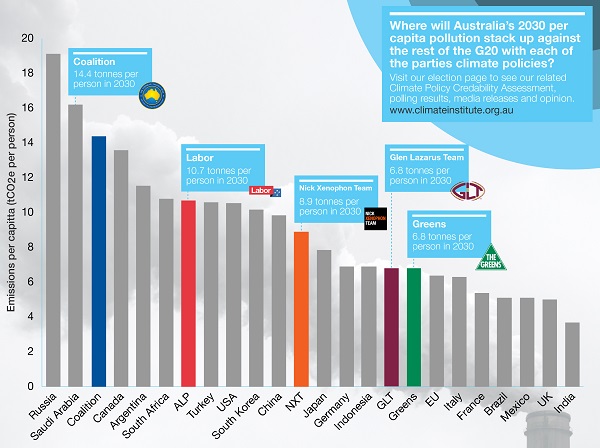
It is noteworthy that Xenophon and the Glenn Lazarus Team made an effort.
A CSIRO survey published last November (pdf here) showed this:
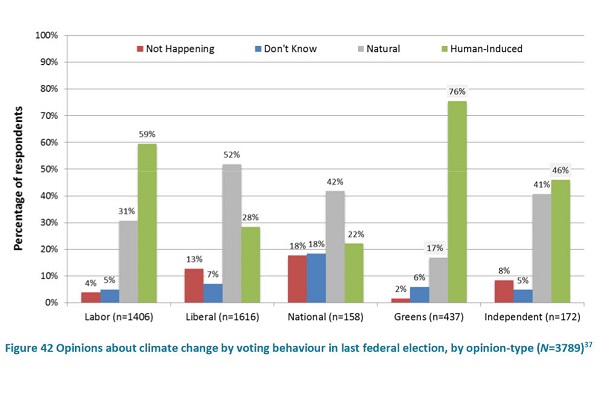
There is work to do, on the Nationals and Liberals in particular – 59% of Labor voters believed climate change was caused by humans, compared to 28% of Liberals, 22% of Nationals, and 76% of Greens. Internationally we are towards the back of the pack in belief in human causation.
The CSIRO also looked at what opinions were based on:
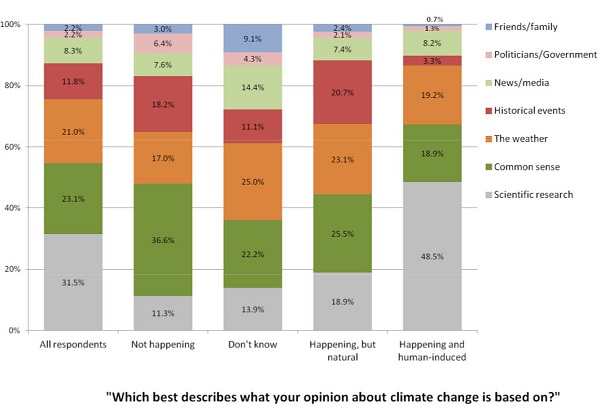
In addition they looked at how the opinion groups felt about their opinions:
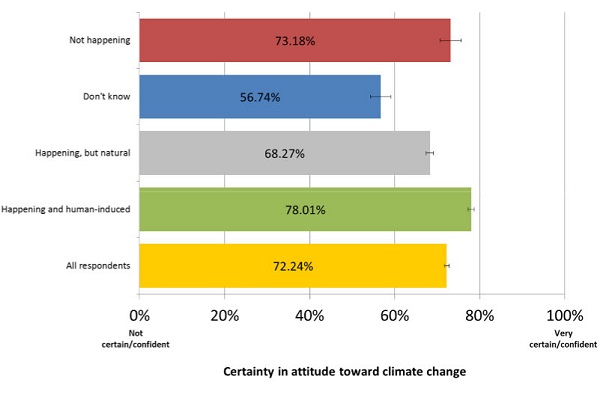
Clearly science plays a significant role in climate change opinion. Skeptical Science has an excellent post on the human fingerprint of global warming.
The degree of certainty with which people hold their views is strong.
Nevertheless, nearly 30% of opinions are less strongly held and presumably susceptible to change.
I would be interested in research on those who do change their views, how and why.
The CSIRO authors believe that climate opinions are embedded in deeply held world views, which of course scaffold their identity, their view of who they are and how they relate to the world.
John Cook, as well as dealing with the scientific arguments, looks at the techniques of denialism:
- fake experts; logical fallacies; impossible expectations; cherrypicking; and conspiracy theories.
Hard core denialists usually claim that science is on their side; Malcolm Roberts repeatedly claims that our views must be based on “empirical evidence”.
Cook says:
- Several studies have linked climate science denial and conspiratorial thinking. If a person disagrees with a global scientific consensus, they’ll typically believe that the scientists are all engaging in a conspiracy to deceive them.
Conspiracy theories, he says, tend to be self-sealing, evidence against a conspiracy is taken as evidence for and the conspiracy is widened to include that evidence. Roberts espouses a conspiracy that encompasses the CSIRO, the Bureau of Meteorology, the IPCCC, Al Gore, international banking families, and the UN Agenda 21, where the voluntary plan for sustainable development coming out of the Rio 1992 Earth Summit is seen as a campaign for global governance.
Graham Readfern has documented Roberts’ track record to date, as well as where Andrew Bolt parted company with him over the anti-Semitic flavour of his Galileo Movement activities.
There is also a bizarre letter to Julia Gillard written in the punctuation style of the “sovereign citizen” movement.
Politicians like Roberts and others who want no action on climate change are not susceptible to change. Malcolm Turnbull as PM and leader of the Liberals has two problems. One is that National Party politicians want no realistic effort on climate change.
Secondly, 65% of Liberal voters either think climate change is not happening or is natural, not caused by humans. That’s actually worse than National voters, where the number is 60%.
Turnbull could work around One Nation and do deals with Labor and/or the Greens, but his voters are not clamouring for change, and indeed seem confused, to put the best face on it. The CSIRO found voters strongly favouring adaptation measures even if they thought climate change was not happening:
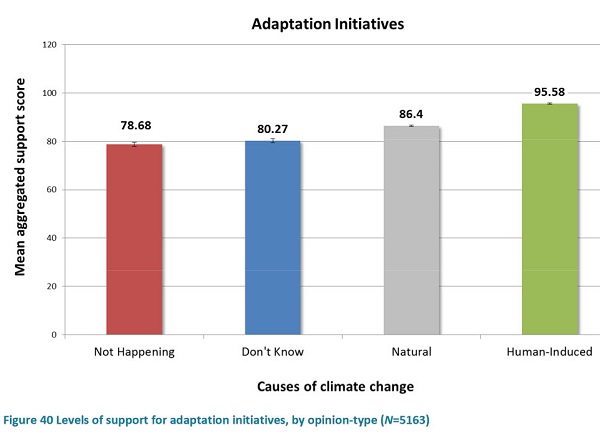
The report did not look at mitigation strategies. Back in 2014 an Essential poll found that 33% favoured replacing the carbon tax with nothing at all, nearly as many as the 38% who either wanted to keep it or replace it with an emissions trading scheme.
Realistically we won’t get change from the conservative side of politics until there is generational change in National Party politicians. There is work to be done at all levels in politics, in business and the community, but we badly need leadership at the national level, as I outlined in Climate change: reconnecting politics with reality:
- a clear and unequivocal public commitment by the Prime Minister that the Australian Government’s highest priority is to achieve an emergency speed transition to a just and resilient post-carbon economy.
And action to match as outlined there by Professor John Wiseman, Deputy Director of the Melbourne Sustainable Society Institute at the University of Melbourne.
The necessary action should be linked with transition and renewal of the economy.
We don’t have time to wait for a Green PM, so can we expect that from Labor? It’s more likely if Hillary Clinton gets a chance to implement Democratic Party policy.
One Nation has cut off the possibility of the Government doing anything at all on climate change with the cross bench, making Xenophon and others also irrelevant. Whatever the LNP does will have to be acceptable to the Nats and then signed off or waved through by Labor and/or the Greens.
Finally, the Brexit people were mightily encouraged by their work and much the same people have now formed Clexit. They share the same dominant demographic – white, male, older.

Any chance it could be the way your fights labelling is so easy to dismiss Brian ?
It may be the questions You ask.
Brian: ” Are you a ” climate denialist ‘ mate ? ”
Joe Blow: ” What ?, Deny there’s a Climate, no, why ? ”
Brian: ” Well you don’t want to stop climate change, are you a ‘ climate change denialist ? ”
Joe : ” I don’t deny the climate has, is or will change. What exactly are you on about ? ”
Brian : ” Are you aware of the ‘ greenhouse effect ‘ ? ‘
Joe ” oh yeah, people in cold arse places make them to grow vege gardens in . Can’t grow them there otherwise. Look, I’m pretty busy, got heaps to do, can you get to the point.
Brian : ” Well, the Planet is warming due to burning fossil fuels and its gotta stop now, it’s catastrophic !! . What are you going to do about your ‘ carbon footprint ” ?, we’ve already warmed too much ”
Joe : ” True, how much ? ”
Brian :” The *IPCC say .74C over the last century !!!! ”
Joe ” What not even a full degree, and some of that natural ? Look I really have shit to do. ” ( walks away )
Brian ” CLMATE DENIER!! , see, I saw that of him straight off the bat”
(*)Averaged over all land and ocean surfaces, temperatures have warmed roughly 1.33°F (0.74ºC) over the last century, according to the Intergovernmental Panel on Climate Change (see page 2 of the IPCC’s Climate Change 2007: Synthesis Report Summary for Policymakers (PDF)). Link.
Brian: A lot of the changes over the last 50 yrs have not be kind to those who have become old working class men and their wives. Free trade globalization has taken away a lot the manufacturing industries that used to provide them with full time permanent jobs and a sense of doing something that was important for the country. Many they have lost their standing as “bread winners” and found themselves unemployable by the time they are 50.
In addition they may feel that the rules have changed to the point where they are the only group people are allowed to be rude about and the only group that it is OK to discriminate against. They are sick of smart elites that want to tell them that they should put up with losing their job for the good of the country and the future of the planet while the smart elites swan around being important and earning much more than the unemployment benefit.
Articles with lots of graphs and demands that the old working class be sacrificed for the good of the planet just aren’t going to be good enough. Somehow we have to show people that they will be better off if we act on climate change.
Jumpy, I’ve used different labels at different times in different contexts, but ‘denier’ or ‘denialist’ seems appropriate here for those who in response to the survey either denied that climate change was occurring, or chose as the cause natural variations over human-induced.
I’m not trying to convince anyone about climate science in this post, so what’s to dismiss? I’m just trying to get a grip on the political possibilities for action.
As to the blog, it’s up there on the left:
I’m not bothering anyone or proselytising. I’m trying to provide the interested lay person with updates and links that keep them abreast of what’s happening as reflected mainly by publication on the net.
John, yes, but the 60 to 65% of conservative voters must take us well beyond the demographic you describe.
The Brexit/Clexit article identifies “white, male, older” as the dominant demographic, but that may have been a bit misleading or limiting. Certainly they are not all poor.
A communications strategy, like advertising, would need to research the characteristics of the target audience. The CSIRO report may go some way.
I guess the conclusion I came to in writing this post is that most change could be achieved by targeting the senior ranks of the Labor Party. The Greens are already on board, and the LNP has lead in the saddle bag which will prevent them from taking any effective action.
The voters are sufficiently on board, but only just, it seems, that elevating climate change to a top tier issue won’t draw a political penalty, but the positive benefits for ordinary lives need to be emphasised.
Julia Gillard in her book tells how she made Wayne Swan find more money for schools while he was desperate for savings. We need a Labor PM who will elevate climate change to the same status as eduction and health.
Just a quick comment on the Brexit vote.
Membership of the EU has been a difficult issue in Britain since the mid-70s. I recall passionate Britons circa 1975 arguing against ceding some sovereignty to a European entity.
Then followed forty years in which pro- or anti-Europe arguments could be advanced, with a wealth of evidence of many types; judgements of European courts; behaviour and decisions of leading bureaucrats; attitudes and negotiations of politicians of many nations; elections to several European parliaments; changing trade, employment, immigration, financial systems, social security, NHS, etc.
A wealth of information and debating points, available to all voters.
I wouldn’t be surprised to find that the formal campaign had little effect.
I suspect that “advertising” is a poor resort in our polity.
***
but that was just the EU.
Meanwhile in Australia rooftop solar PV is humming along, wind power used more widely, home insulation and passive solar improving well; battery storage looking hopeful. Appliance and vehicle efficiencies improving, emissions dropping. Folk are voting with their wallets at the home and small enterprise level. Some States assisting.
Soon, the politicians will have to play catch up.
I’m not having a direct go at you Brian, it’s just, after all this time with all the media and all the smartest left wing heads youse have yet to find a solid label for folk that don’t think, as you do, that the amount of warming due to carbon based fuels and petrochemical product use is catastrophic.
It also doesn’t help y’all that y’all use shit loads too on a daily basis.
Just tryin to help coz I like you Mate.
To clarify, if you have to demonise an activity then indulging yourself doesn’t give credibility and renders useless any label or argumentative voice you have.
You’re a patronising buffoon, Jumpy. The only takeaway from your opening comment is that it is the largest jumble of words that you’ve been able to mush together in as long as I can remember.
From my observations denialists exhibit many of the traits of schoolyard bullies, clubbing together in cliches, disguising their mental laziness with intimidation and bravado, and protecting their ignorance with a procession of slogans and mantras.
Malcolm Roberts is a special kind of denialist being one who is so far into the fiction that he has become a part of it.
Nice.
Jumpy, I’m not looking for a label to describe everyone that doesn’t agree with me.
However, if believe that mitigation is not necessary or not urgent, then you’ll need to demonstrate that mainstream climate scientists are wrong. The seriousness of the risks means that there is no fence to conveniently sit on.
Conspiracy theory is a convenient way of doing this, but the conspiracy theory that all those scientists are corrupt does not pass the common sense test.
To go back to your Joe in your first comment, he’s not a denier on that evidence.
FYI I would never engage in the way you suggest, so your little story is a caricature.
Brian, Joe is the kind of person that deniers prey upon. Typically Joe is in his late 60’s, has been living his life on his high school science knowledge gained from a 1950’s curriculum, and has done little to keep his science knowledge up to date. He also has lived his life with fond memories of a 1950’s environment, 1950’s attitude to nature, and a 1950’s belief that there are abundant resources for humans to exploit for hundreds of years into the future. Joe is also not struggling. He lived his entire working life with one employer rising to a senior sub executive role in his company which moved offshore in the noughties giving Joe a huge redundancy payment with which he bought a leveraged “investment” property. Joe is pretty pleased with his outcome, he lives in air conditioned comfort so a little extra heat is of no consequence to him, hence his “What not even a full degree, and some of that natural ? ” remark. Joe doesn’t want any thing to change because everything is working quite well for him, so when Tony Abbott pestered every stay at home retiree with two years of daily “Toxic Tax” and procession of climate denial miss information Joe signed up and subsequently voted for the now disgraced climate denier.
That is Joe’s story. Sadly there are so many Joes, and they all vote.
There is another story, and that is the story of Mike. Mike is a “millennial” who is struggling his way through university. Mike is clocking up a massive Hex debt as he works two part time jobs to pay the exorbitant rent for his six way shared flat, which he believes is owned by a “baby boomer” retiree who never fixes anything as he is too often on overseas trips. Mike is a bit despondent this week as he has heard that there is little demand for science graduates, and the LNP government is determined to lower the ceiling on hex debt repayment thresh holds. As Mike ponders his future it is all looking very different to the future his father faced in his youth. Mike knows full well that Global Warming driven Climate Change is accelerating and this will limit the options for him if he gets to a time settle down. Home ownership for him looks impossible, even renting is a permanent struggle, and the prospect of a stable job in the future in this his country is totally unrealistic as there are so few businesses left that produce the technical products that he imagined he would be involved with when he was in high school.
Bilb: We are drifting a bit off topic but I finished school in 1960. and was paid by the government and BHP to do my engineering degree and went on to live my life something like your mate Joe. At the time I started work the challenge was to decide which job i would take. I didn’t know anyone who didn’t get a job when I left school. (No, I didn’t come from a privileged suburb or go to a private school – Unemployment was simply very low.)
Bought a block of land unsewered) when I was about 22 and we were living in our own home by the time we were 25. (The total cost was about 2 times the annual salary of a junior engineer.)
In general people’s lives were getting better. So what was different?
1. The country was run by men who had lived through a depression and at least one world war.
2. The communists were considered a real threat. Neither government nor business were willing to risk making the workers too dissatisfied.
3. The government controlled the flow of money, people and goods across our borders. No waffling on about the benefits of free trade.
4. The Brenton woods agreement meant currency values were stable.
5. Housing standards were not high.
6. Except in special areas the cost of a block of land was much lower than the cost of the house built on it.
7. Only about 5% of school leavers went to universities.
None of the above is true these days. You are free to speculate what changes have left your mate Mike relatively much worse of than my generation.
8. Bank loans were limited to what could be paid off at 25% of the male income.
Feel free to speculate why Mike is much worse off than my generation was.
Good questions, John D. The millennial angle came up from my 18 yo daughter who was commenting on an article which demonstrated that the millennials are the first generation in a century to start life worse off than their parents. This is not the article, but it is one of many
http://www.marketwatch.com/story/5-charts-that-prove-millennials-are-worse-off-than-you-are-2016-07-19
On home ownership a junior engineer would be on around 60,000 today so income to home cost ratio factor would be from 5 to 12. And that would only become possible after they had paid out much of their hex debt. There is one other difference and that is that you would have had to save at least 25% of the value before getting a loan. Today that is different but entry deposit level is rising again. When I left school in the late 60’s it was common practice for people to buy a block of land and build a garage to live in while they saved for the deposit to build the house. I doubt that would be legal today.
It is one perspective to say that only 5% of school leavers got university degrees in the 60’s, but today job prospects for those without degrees are ever more limited. However, the 5% figure may very well explain why climate denial is so prevalent amoungst retirees, proportionally far fewer people with an appreciation of science, nature’s forces and the environment.
As an aside I dispute the housing standards argument. Standards are different, though not necessarily better. My father was an architect so I had the 1950’s domestic housing specification and standards book available to me and have studied it thoroughly. Materials have changed, techniques have changed, and building requirements have tightened up (earthquake, fire, access) but I do not think that it can be said that “standards” have improved.
The real difference between Joe and Mike is that while Joe is nursing his nest egg with a view to being comfortable in his dotage while he contemplates the past and the last thing he wants is change, Mike is looking forwards to a life that, from all of the evidence, will be a struggle for survival as well as being aggressively competitive, and while he has more apparent options available to him, real options for security are very few and declining as each lustrum slides by. Mike understands Global Warming, Climate Change, and Resource Depletion and can see how that will impact on his future. That is why Mike is a climate alarmist.
Bilb: It may sound a bit sexist but the thing that really boosted the price of housing was the growth of two income families and the assumption that the two incomes would not be some temporary situation before the woman started to have kids. (Related is the age when women start having babies. When my wife had her first baby at 25 she was considered an “old mother.”)
The other thing is that councils have pushed more and more costs on to developers and insisted on higher standards so the real cost of ready to build land has gone up considerably even if you were to cut the developers profit margin. Then there are covenants that stop you putting up something cheap.
That is all true, John D. Developers protect profits with thinner materials. I was watching the roof on the house next door being put together (upgrade). More trusses with more joints, much thinner sections and all gang nail assembled. That roof is certainly going to be way stiffer than my 1964 roof. technically a better roof even though it has a minimum of lineal material for the number of truss points. Then the gutters and cladding are only .45 thick zincalume which although are half the thickness of tin from the past will have a superior life. Better performance, less material, all possible with improved technology. But when it comes to interiors the materials deliver living effect as long as nothing goes wrong. The Brisbane floods highlighted the substandard performance of modern materials in adverse environments. House linings floor coverings and furniture all wound up on the street heading for the tip after the waters subsided.
So where politicians are softening us up for their get out of jail free line, …” we will have to adapt to climate change “…, this will require that current building standards will all have to be scrapped and reconsidered as very few buildings these days are designed to cope with the full spread of destructive global warming climate effects,…Flood; Deluge; Fire; Extreme Wind; Long Term Heat; Earthquake; Snow/Hail Dumps.
wrong term “super feet” in place of “lineal material”
Earthquakes now ?
How about Climate induced Asteroid impacts ?
Opps, there’s me being a patronising buffoon again, so sorry ( not ).
Do some research, Jumpy. You will find a fair body of comment looking at the probability of earthquakes being triggered by the shifting mass of water as it melts from various places and moves to the equator. These are earthquakes that would happen eventually (probably), it is just the timing of them that is brought forward as the earths crust adjusts to the shifting mass of water.
One Global Warming fact that never gets mentioned is that without it the earth’s surface was moving steadily into the next ice age. So when talking about the global average temperature rise, the real temperature rise is that figure plus the amount that the global temperature would have reduced by over the last 200 years without human intervention. The same applies to earth quake activity. Had the poles been accumulating ice for the last 200 years instead of loosing it a break neck speed, earthquakes would be happening more in some parts and less in other parts. The process is called isostatic rebound which you can read all about here…
https://en.m.wikipedia.org/wiki/Post-glacial_rebound
This subject is also one of the denialists favourite tools to argue against sea level rise. Jo Codling at one stage was using a point in Norway where the isostatic rebound rate largely cancelled out the sea level rise so she could say “see! No sea level rise here….and the exception breaks the rule”. Denialism is all smoke, mirrors, and stupid people.
Bilb: I am old enough to remember when New Scientist was expressing concern that we might be moving into an ice age.
Yes, John D.
It is clearly visible in the hockey stick graph. 10,000 years ago climbing out of the last ice age, a six thousand year stable warm period, then the temperature begins the decline into the next mini ice age only to be suddenly arrested by human intervention.
http://www.futuretimeline.net/blog/2014/04/18-2.htm#.V68bk_l979Q
The other kind of mini ice age that science was pondering was an event triggered by the collapse of the Atlantic Conveyor Current which brings heat from the Indian ocean and the Caribbean to the North Atlantic. This, it is speculated, is triggered by a huge flush of freshwater from one of a number of possible natural events forcing the conveyor to salt water buoyant current to submerge before it gets to Europe thereby plunging the European continent into a period ice age like conditions.
There may be other like kind potential events that I have not read about.
Looks like the Poms will get one anyway because of the Greenhouse effect, according to experts.
Hope the death toll isn’t as high as the last one in the 1600s.
( no mention of earthquakes )
From Jumpy’s link
I think, Jumpy, that we take that one, from the tits and bums Sunday Express and their unnamed “experts”, and see what happens. There is a large body of fresh water (less saline) flowing out of the Arctic Ocean and that could impact on the Atlantic Conveyor current so a long cold snap for Northern Europe is possible, but I think that other climate influences will subdue that effect. The Solar minimum has a very marginal influence and Grahame Madge points out.
Anyway, the forecast is logged here on Climate Plus on the 14/08/2016 under Jumpy Predicts. Time will tell.
My prediction ? No.
If it’s only the Poms (or even Europe as a whole), it’s not an “ice age”, it’s just a period of cold weather.
Two things to keep in mind:
1. The worlds climate is complex and some effects of global warming may produce colder weather in some places.
2. Ocean acidification is important. Some key species in the food change depend on being able to produce calcium carbonate for shells ect. Gets harder if not impossible as dissolved oxygen goes up.
BilB, I think you might be referring to the Younger Dryas, where the temperature dropped by 2 to 6 degrees in Europe and elsewhere in the Northern Hemisphere in a matter of decades in c. 12,900 calendar years BP and stayed that way until c. 11,700 ago.
People will have noticed the cold spot near Greenland in world temperature maps, as in this post.
Stefan Rahmstorf recently took a look at the periodic slowdown of the Gulf Stream System or AMOC (Atlantic Meridional Overturning Circulation), which is then followed by something of a recovery.
The main effects include harsher winters in northern Europe and parts of north America, increased hurricane activity in the Caribbean, and sea level rise on the eastern seaboard of the US.
Of the future he says:
Yes, those influences, but more specifically about this dynamic situation
http://www.nature.com/news/2006/060403/full/news060403-9.html
which may increase rapidly if the tundra melts faster.
I haven’t read the other completely so I’m sorry if I am repeating information.
Jumpy, what bugs me about your Joe Blow is his blithe dismissal of climate science.
Ignorance of climate science may be a reason for dismissing urgent concern about climate change, but it’s not an excuse.
You make light of a 0.74ºC increase in temperature (it’s more than 1ºC currently) and then link to a NASA site which shows CO2 levels bolting above where they’ve been for more than 600,000 years.
I won’t go on from there, because we’ve been over it many times before.
Read this post on sea level rise and the post I linked to at Skeptical Science, and tell me and more particularly 97% of climate scientists why they should be relaxed and comfortable.
What was the question asked of the climate scientists ?
If it’s ” does increased co2 ( by Mankind ) in the atmosphere have a warming effect ” then I, and probably Joe, agree.
Jumpy, its symptomatically a warming effect, but in practice it is a burning and drowning effect.
The .75 is an average effect for just one small part of the energy involved. The real energy sump is the earth’s liquid surface which is evaporating at a greater rate. It is what that humid air does is the effect of Global Warming.
Its not about average air temperature, its about actual temperature where ever people attempt to live and how much precipitation they get, how it is delivered, at what rate and in what form they get it.
Frankly, Joe is a total idiot who deserves to have his assets demolished by the elements.
Jumpy, just to concentrate the mind a bit, have a look at David Archer’s 2006 graph from my SLR post:
Coming out of the last ice age each degree of global warming was worth about 20 metres of sea level rise. Given the amount of ice left, each degree of future warming is on average worth about 15 metres of SLR.
Click onto the Firetree flood maps and find Mackay at 13m.
The question is not whether, but when, and what sort of legacy you want to leave your progeny.
Graham Readfearn details Roberts’ record in attacking and harrassing climate scientists.